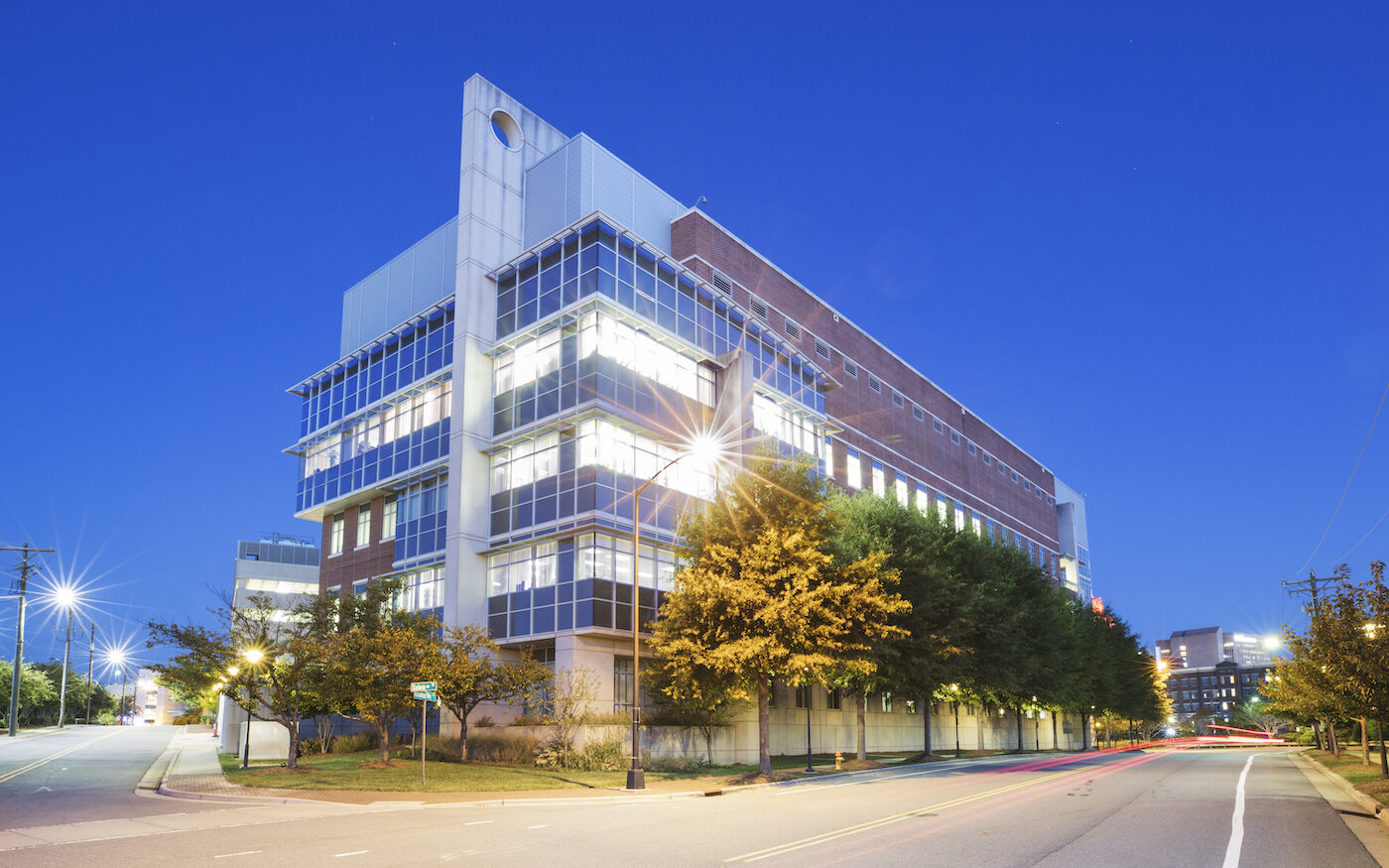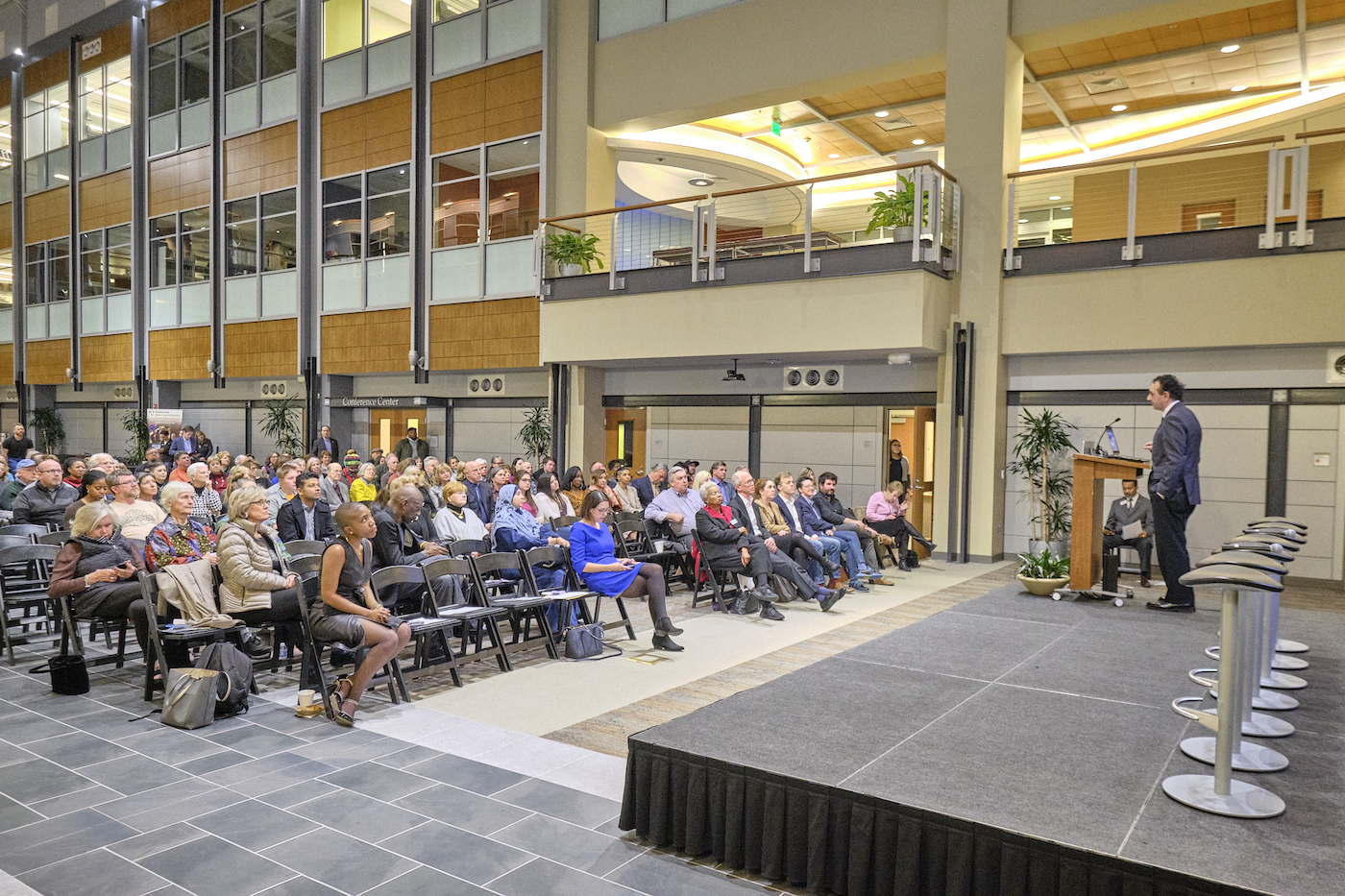From developing the world’s first lab-grown organ (a bladder) to the body-on-a-chip platform used for drug toxicity testing and personalized medicine, Winston-Salem-based scientists have been integral to cutting-edge regenerative medicine breakthroughs. More recently, Winston-Salem, known as the “City of Arts and Innovation,” has doubled down on its commitment to fostering an innovation ecosystem from which groundbreaking regenerative medicine therapies can emerge.
What is Winston-Salem’s RegenMed Hub?
The Winston-Salem RegenMed Hub is an unprecedented core of innovation in regenerative medicine. It provides physical space and access to a vast network of experts from a variety of fields to collaborate on the most promising research in the world of tissue engineering technologies. Members are working towards a single goal: speeding up translation of regenerative medicine treatments while maximizing safety and efficacy.
The RegenMed Hub creates a unique environment of collaboration and innovation. By harnessing the collective power of a multi-disciplined team of experts, this network has shown that this field of medicine can revolutionize treatments and therapies.


What Makes Up the Regenerative Medicine Innovation Ecosystem?
Wake Forest Institute for Regenerative Medicine
The Wake Forest Institute for Regenerative Medicine (WFIRM) was established in 2004 and is a leader in developing cell-based therapies and tissue engineering. Since then, WFIRM has been responsible for innovative breakthroughs such as creating functional human tissues, developing biodegradable scaffolds for tissue engineering and 3D printing vascularized liver and kidney tissues that are being sent to the International Space Station.
As part of Winston-Salem’s RegenMed Hub, WFIRM shares its years of experience and knowledge in tissue engineering, cell therapies, diagnostics, drug discovery, biomanufacturing, nanotechnology, gene editing and 3D printing.
RegenMed Development Organization (ReMDO)
The RegenMed Development Organization (ReMDO) in Winston-Salem, North Carolina is a pioneering research and development non-profit for regenerative medicine. Utilizing a network of leaders in the field, ReMDO facilitates the development of cutting-edge regenerative medicine technologies, treatments and therapies that have the potential to improve quality of life and cure diseases.
Through ReMDO, regenerative medicine researchers, clinicians and engineers have access to more than just each other’s expertise:
- RegeneratOR Test Bed: Provides access to advanced biomanufacturing equipment and programs to support prototyping and product development.
- RegeneratOR Innovation Accelerator: Supports start-ups, growth companies and established companies throughout the development cycle, from research to commercialization.
- RegeneratOR Workforce Development: Provides training and connects an educational ecosystem of colleges, university programs and technical schools with biomanufacturing staff, engineers and research leaders.
- RegenMed Clinical Trials Catalyst: Enables research teams and regenerative medicine companies with potential therapies to access patients for FDA human clinical trials. The Catalyst has access to 5.5 million patients, serving 67 hospitals and more than 1,000 outpatient facilities. Javara Inc., a Winston-Salem based company that works to integrate clinical research and clinical care to improve patients’ health by ensuring that clinical trials are readily accessible as care options, is also involved.
- Humanoid Sensor Consortium: Uses a system of chips and microfluidic devices that function similarly to actual human organs to accelerate drug development and personalized medicine.
- Regenerative Manufacturing Innovation Consortium (RegMIC): Focuses on identifying, developing consensus and accelerating breakthroughs on critical regenerative medicine manufacturing challenges for the benefit of all.
- Regenerative Medicine Manufacturing Society (RMMS): Dedicated solely to advancing the field of regenerative medicine through manufacturing.


Innovation Quarter
Winston-Salem’s Innovation Quarter is an urban neighborhood of mixed-use buildings and public spaces that houses a vibrant innovation ecosystem. With research facilities and incubators, tech centers and medical centers, restaurants and apartments, the Innovation Quarter is a hotspot of creativity, collaboration and entrepreneurial spirit. It is rapidly becoming the epicenter for healthtech advancements in the region, with a mission to revolutionize health and wellness through the power of technology.
As part of the RegenMed Hub’s innovation ecosystem, the Innovation Quarter plays matchmaker to pair experts and professionals from various disciplines so they can share ideas, inspire innovation and bring new products and services to market. With its combination of creative spaces, incubators, accelerators and cutting-edge research facilities, the Innovation Quarter fosters the community of innovators driving the city’s remarkable healthtech advancements.
Regenerative Medicine Companies
The RegenMed Hub is attracting numerous regenerative medicine start-ups and established companies seeking to usher their products and technologies to market. By operating within the region, these entrepreneurs and life science professionals can access the resources and equipment made available through the RegenMedHub and share their expertise and learnings with others.
These companies, dedicated to advancing a broad range of technologies and therapies, are the lifeblood of the regenerative medicine innovation ecosystem. A few that have made their way to Winston-Salem include:
- AlloSource: One of the world’s leading manufacturers of fresh cartilage tissue used for joint repair and skin allografts to heal severe burns.
- ProKidney: A clinical-stage biotechnology company focused on restoring or improving kidney function to stop or delay the progression of chronic kidney disease.
- Etaluma: Bringing high-resolution, lower priced fluorescence microscopes to market that can be used in a broader range of labware and settings, including live cell imaging in incubators, hoods and other challenging locations.
An Innovation Ecosystem at the Forefront of the Regenerative Medicine Revolution
Over the years, Winston-Salem’s research institutions have made incredible strides in advancing regenerative medicine, and now, the city is at the forefront of the regenerative medicine revolution. Through its commitment to providing resources and expert guidance to those pursuing cutting-edge therapies, Winston-Salem’s RegenMed Hub will remain a leader in regenerative medicine research, development and commercialization.




